中考英语听力题常见30个情景对话及常用语汇总
中考英语常考情景交际
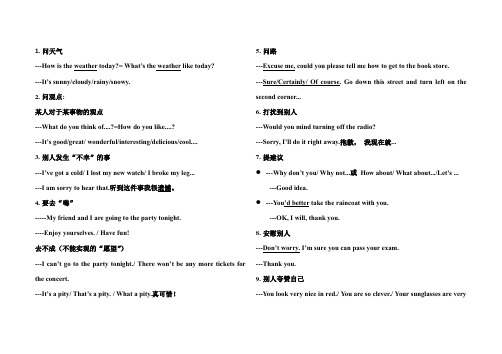
1.问天气---How is the weather today?= What’s the weather like today?---It’s sunny/cloudy/rainy/snowy.2.问观点:某人对于某事物的观点---What do you think of....?=How do you like....?---It’s good/great/ wonderful/interesting/delicious/cool....3.别人发生“不幸”的事---I’ve got a cold/ I lost my new watch/ I broke my leg...---I am sorry to hear that.听到这件事我很遗憾。
4.要去“嗨”-----My friend and I are going to the party tonight.----Enjoy yourselves. / Have fun!去不成(不能实现的“愿望”)---I can’t go to the party tonight./ There won’t be any more tickets for the concert.---It’s a pity/ That’s a pity. / What a pity.真可惜!5.问路---Excuse me, could you please tell me how to get to the book store.---Sure/Certainly/ Of course. Go down this street and turn left on the second corner...6.打扰到别人---Would you mind turning off the radio?---Sorry, I’ll do it right away.抱歉,我现在就...7.提建议●---Why don’t you/ Why not...或How about/ What about.../Let’s ...---Good idea.●---You’d better take the raincoat with you.---OK, I will, thank you.8.安慰别人---Don’t worry. I’m sure you can pass your exam.---Thank you.9.别人夸赞自己---You look very nice in red./ You are so clever./ Your sunglasses are verycool. ---Thank you.10.假期/旅途●---I am going to take a vacation in Qingdao .---Have a good holiday!/Have fun!/ Enjoy yourself! / Have a good trip! ---Thank you!●----How was your holiday/vocation/trip?---It was great/exciting/wonderful/terrible.11.问可能性---Do you think we can travel in space in the future?---Yes, I think so. / No, I don’t think so.12.问交通方式---How do you usually go to school?----By bus./ By bike. / By car....13.一般疑问句---Do you .... ---Yes, I do. / No, I don’t.---Did you.... ---Yes, I did. / No, I didn’t.---Can you... ----Yes, I can. / No, I can’t.----Have you.... Yes, I have. / No, I haven’t.14.问未来职业----What do you want to be when you grow up?----A doctor/teacher/scientist.15.问多少...-----How many stops before getting to central park? ----About 10 stops.16.问年龄----How old is your younger sister?----She is nine.17.谈毕业-----We’re leaving school. Time to say goodbye.----I will miss you.18.禁止做某事----Sorry sir, you mustn’t take photos here.---- Oh, sorry.19.问“怎么了”----What’s the matter with Nancy?----She isn’t feeling well.她感觉不舒服。
初中中考英语听力常考的英语对话
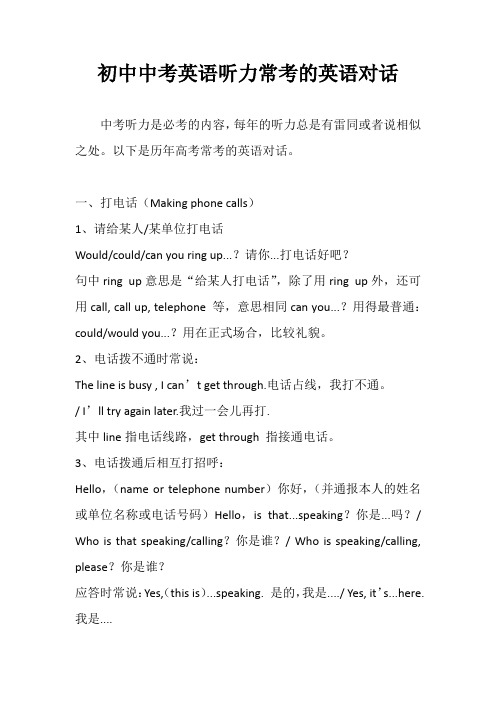
初中中考英语听力常考的英语对话中考听力是必考的内容,每年的听力总是有雷同或者说相似之处。
以下是历年高考常考的英语对话。
一、打电话(Making phone calls)1、请给某人/某单位打电话Would/could/can you ring up...?请你...打电话好吧?句中ring up意思是“给某人打电话”,除了用ring up外,还可用call, call up, telephone 等,意思相同can you...?用得最普通:could/would you...?用在正式场合,比较礼貌。
2、电话拨不通时常说:The line is busy , I can’t get through.电话占线,我打不通。
/ I’ll try again later.我过一会儿再打.其中line指电话线路,get through 指接通电话。
3、电话拨通后相互打招呼:Hello,(name or telephone number)你好,(并通报本人的姓名或单位名称或电话号码)Hello,is that...speaking?你是...吗?/ Who is that speaking/calling?你是谁?/ Who is speaking/calling, please?你是谁?应答时常说:Yes,(this is)...speaking. 是的,我是..../ Yes, it’s...here. 我是....4、打电话请对方找人或留言:Is...in/at home?某某在家吗?/ Can/may/could I speak to..., please?请...接电话好吗?/ Will/would you give a message to..., please?请给...捎个口信好吗?/ Would you tell him my telephone number, please?请你把我的电话号码告诉他好吗?/ Can/could you ask...to ring me back, please?请叫...给我回个电话好吗?应答时常说:Hold on/Wait a minute/One moment, please. 请等一等/ I’m sorry...is not in./at home now.对不起,...现在不在/ Can I take a message?我能给你捎口信好吗?/ Does he have your telephone number?他有你的电话号码吗?/ I’ll ask him to call you back. 我叫他给你回电话二、劝告和建议(Advice and suggestion)1、You’d better(not)do sth... 你最好(不)干..../ You should do sth. 你应该干..../ You need(to)do sth. 你需要干....2、Why don’t you do sth?为什么不..../ Why not do sth?为什么不....这是以反问的方式提出劝告或建议,含有建议对方去干某事的意思,而不是询问对方为何不去干某事的原因。
中考英语情景对话必背句型归纳总结
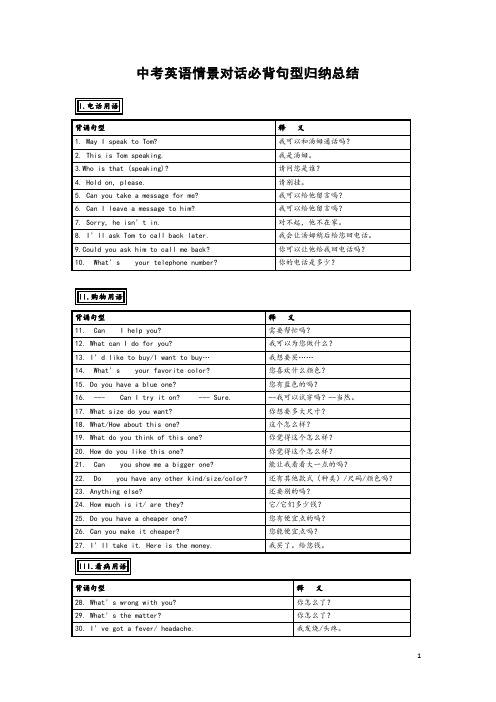
表示感谢答谢:
释义 做……怎么样? 为什么不……? 你最好…… 好主意! 听起来很棒。
3
背诵句型 92.Thanks! 93.Not at all. 94.You’re welcome. 95.It’s my pleasure. 96.That’s OK.
表示(不)同意/赞同: 背诵句型 97. Sure. 98. I agree with you. 99. Yes, I think so. 100. I am afraid not. 101. Sorry, I don’t think so.
中考英语情景对话必背句型归纳总结
I.电话用语
背诵句型 1. May I speak to Tom? 2. This is Tom speaking. 3.Who is that (speaking)? 4. Hold on, please. 5. Can you take a message for me? 6. Can I leave a message to him? 7. Sorry, he isn’t in. 8. I’ll ask Tom to call back later. 9.Could you ask him to call me back? 10. What’s your telephone number?
释义 你怎么了? 你怎么了? 我发烧/头疼。
初中阶段情景交际——听力与口语资料(全)

初中阶段情景交际——听力与口语资料(全)1. 问候(Greetings)A. —Hi, Mike.—Hi, Lucy.B. —Hello, I'm Mike. What's your name?—My name is Sandy. Nice to meet you.—Nice to meet you, too.C. —Good morning/afternoon/evening.—Good morning/afternoon/evening.D. —Glad/Pleased to meet you.—Glad/Pleased to meet you, Andy.E.—How are you?/How are you doing(going)?/How is it going?/How’s everything going? (“最近过得怎么样?”多用于电话或信件开头)—Great(很好)/Not bad(还不错)/Terrible(糟糕)F.—How do you do?(你好)—How do you do?(你好)2.致谢(Thanks)Thank you./Thanks very much. =That's /It’s very kind/nice of you.(你真是太好了,相当于“谢谢”)答:—My pleasure. /It’s a pleasure.(我的荣幸)—You are welcome. (不客气)—Don't mention it. (不足挂齿)—Not at all.(不客气)3. 道歉(Apologies)—I'm sorry.—That's OK./That’s all right./It doesn’t matter./Never mind. (没关系)注意区分:That’ right.正确That’s all right.=That’s OK.没关系All right =OK 好的4. 邀请(Invitation)A. —Would you like to go and see a film?—Yes, I'd like to. (我很乐意)/Of course.(当然)/I'd love to, but I'm afraid I have no time.(我很乐意,但是恐怕我没有时间)B. —Could you come to my party?—Sure. /Of course./certainly.—I'd love to,but I have to……(我很乐意,但是我不得不……)—Sorry,I can’t. I have to……—I’m afraid not.(恐怕不能)5. 请求允许(Asking for permission)A. —Can/could/May I do …….?—Sure. /Of course./certainly.—I’m afraid not.B. —Can/could/ you do …….?—Sure. /Of course./certainly./No problem(没问题)/with pleasure.(乐意效劳)—I’m afraid not.(恐怕不能)—Sorry,I can’t. I have to……—No way.(没门)6. 祝愿和祝贺(Expressing wishes and congratulations)—Have a nice day! /Have a good time! /Enjoy yourself.(用于对方旅行玩耍的祝愿)—Best wishes! (通用)—Wish your team good luck. /Good luck.(用于对方比赛match或者考试test的祝福)—Congratulations.(恭喜,用于对方毕业graduation或者取得好成绩get good grades或者奖项win the prize (get the first place)的祝贺)—Thank you.(答语,通用)—The same to you.(你也一样,用于回复公共节日Happy New Year等的祝福)7. 打电话(Making telephone calls)A. —Hello,May I speak to Daniel, please? (我能跟Daniel通电话吗?)—Sorry, he's not at home. Who's that speaking, please? (你是谁?)—This is Sam. Can you ask him to call me back?(回电话)B.—Hi, This is Jane speaking.Is that Li Lei?(你是李磊吗?)—Hi, Jane. How are you doing?注意:电话用语,除了“May I……”句型用“I”表示“我”,其余都用“This”代表“我”,“that”代表“你”。
初中英语听力最常考的30个对话情景_中考英语
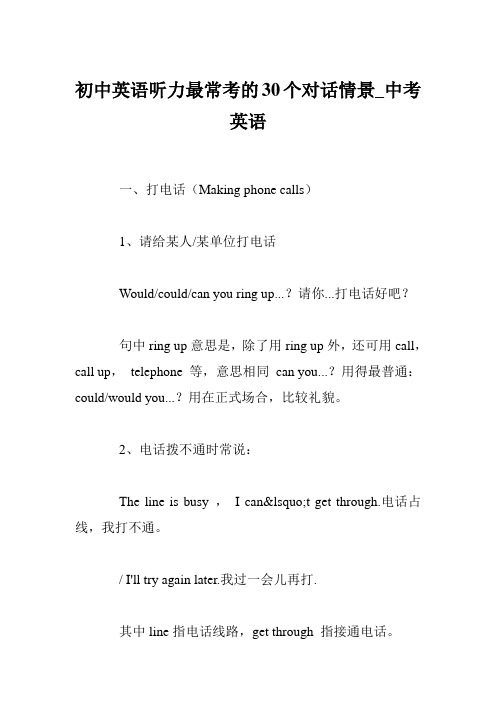
初中英语听力最常考的30个对话情景_中考英语一、打电话(Making phone calls)1、请给某人/某单位打电话Would/could/can you ring up...?请你...打电话好吧?句中ring up意思是,除了用ring up外,还可用call,call up,telephone 等,意思相同can you...?用得最普通:could/would you...?用在正式场合,比较礼貌。
2、电话拨不通时常说:The line is busy ,I can‘t get through.电话占线,我打不通。
/ I'll try again later.我过一会儿再打.其中line指电话线路,get through 指接通电话。
3、电话拨通后相互打招呼:Hello,(name or telephone number)你好,(并通报本人的姓名或单位名称或电话号码)Hello,is that...speaking?你是...吗?/ Who is that speaking/calling?你是谁?/ Who is speaking/calling,please?你是谁?应答时常说:Yes,(this is)...speaking. 是的,我是..../ Yes,it‘s...here. 我是....4、打电话请对方找人或留言:Is...in/at home?某某在家吗?/ Can/may/could I speak to...,please?请...接电话好吗?/ Will/would you give a message to...,please?请给...捎个口信好吗?/ Would you tell him my telephone number,please?请你把我的电话号码告诉他好吗?/ Can/could you ask...to ring me back,please?请叫...给我回个电话好吗?应答时常说:Hold on/Wait a minute/One moment,please. 请等一等/ I‘m sorry...is not in./at home now.对不起,...现在不在/ Can I take a message?我能给你捎口信好吗?/ Does he have your telephone number?他有你的电话号码吗?/ I'll ask him to call you back. 我叫他给你回电话二、劝告和建议(Advice and suggestion)1、You‘d better (not)do sth... 你最好(不)干..../ You should do sth. 你应该干..../ You need(to)do sth. 你需要干....2、Why don‘t you do sth?为什么不..../ Why not do sth?为什么不....这是以反问的方式提出劝告或建议,含有建议对方去干某事的意思,而不是询问对方为何不去干某事的原因.3、What/How about +名词或动名词...?这种句型表达随便的建议,有征求对方意见的意思,多数情况下是建议和对方一起做某事。
中考英语情景对话常考句型

中考英语情景对话常考句型1.问候GreetingsGood morning/afternoon/evening. 早上/下午/晚上好!Hello/Hi.您好!How are you? 你好吗?Fine, thank you, And you? 很好,谢谢你呢?I am fine,too 我也很好。
How’s it going?…? …最近好吗?Great/Not bad/Terrible. 很好/还行/糟糕的。
Good night. 晚安。
I am afraid I have to go now . 我现在不得不走了。
We had a good time! 我们玩的很开心。
It is a pleasure! 不客气。
Take care. 保重。
4.打电话Making telephone callsHello! May I speak to…? 你好,我能跟XXX说话吗?Is that… (speaking)? 你是XXX吗?Just a moment . 等一会。
Hold on, please. 等一会。
He/She isn’t here right now. 他现在不在。
Can I take a message for you? 我能替他捎个口信吗?Yes,please. 是的,麻烦啦。
This is…speaking. 我是XXXWould you please tell Mr.Green that I called? 能告诉格林先生我给他打了个电话吗?5.祝愿,祝贺和应答Good wishes, congratulations, responsesGood luck! 好运。
Best wishes to you. 给你最好的祝愿。
8.邀请和应答Invitations and responsesWill you come to…? 你会来…?Would you like to…?Do you want to ….?你想做….吗?Yes, I’d love to… 是的,我愿意Yes, it’s very kind/nice of you. 你人真的是太好啦。
初中英语听说情景交际中考常考点

情景交际中考常考点考点1.问候、介绍与告别1.常见的问候用语有:Good morning/afternoon/evening!Hello/Hi!How do you do?Nice to see(meet)you.How are you?等。
答语可以是别人怎么打招呼,你也怎么回。
如:Good morning/afternoon/evening!Hello/Hi!How do you do? Nice to see(meet)you.等。
How are you?的回答一般是:Fine,thank you.And you?或者Very well,thank you.如:—How are you these days,Mary?—Fine,Thank you.And you,Tom?2.常见的介绍用语有:This is.../My(His/Her)name is...3.常见的告别用语有:Good bye/Bye-bye/Bye!See you later/tomorrow.Good night!等。
考点2.感谢、祝愿与同情遗憾1.当别人帮了你或赞扬你时,你应该说感谢的话。
常用的感谢用语有:Thank you very much.Thanks a lot. Many thanks.Thanks for...That’s very kind of you等。
答语有:My pleasure.That’s all right.You are welcome.Not at all.Don’t mention it.等。
如:—Thank you for sending me home tonight.—My pleasure.2.当别人发生了不幸的事情时,你应该说同情与遗憾的话。
表达同情遗憾的常用语有:What a pity!;I am sorry to hear that.等。
如:—I lost my iPod on my way to my office.—I am sorry to hear that.考点3.打电话1.请……(某人)听电话时的常用语有:Hello.May I speak to...,please?/Is that...speaking?2.接电话时的常用语有:Hold on,please.He/She isn’t in.Can I take a message?This is...speaking.3.在电话中介绍自己用:This is...。
最新中考英语听力常考话题(精确整理)

精品文档中考英语听力常考话题-------------- Lisa 整理一、 30 句日常用语1.A: Hi! / Hello! 你好! B: Hi! / Hello! 你好!2.A: Nice to meet you. 见到你很高兴。
B: Nice to meet you too. 见到你我也很高兴。
3.A: How are you? 你好吗?B:I am fine, thank you. How are you? (And you? ) 我很好,谢谢。
4.A: Good morni ng? B: Good morni ng! 早上好?早上好!5.A: Good afternoo n? B: Good afternoo n! 下午好?下午好!6.A: Good eve ning? B: Good eve ning 晚上好?晚上好。
7.A: Good night! 晚安。
B: Good night! 晚安8.A: What is your name? 你叫什麽名字? B: My name is Lisa.9.A: How old are you? 你几岁了? B:I am fourteen years old我十四岁。
10.A: How tall are you? 你有多高? B:I ' m65metres 我身高 1 米 5511.A: How heavy are you? 你有多重? B:I ' m 48kilogran 我有 48 公斤。
12.A: When is your birthday? 你的生日是什么时候?B:My birthday is in May. 我的生日在五月。
13.A : When do you get up? 尔什么时候起床。
B: I get up at 7:00 o 我亡嚴起床。
14.A : When do you do morning exercise? 你什么时候做早操?B: I usually you do morning exercise at 8:30我通常在 8:30 做早操。
初中英语2024届中考常考情景交际用语(共12类)

中考英语情景交际用语1.问候(1) Hello!/Hi!你好!(2) Good morning/afternoon/evening! 早晨/下午/晚上好!(3) How do you do! 你好!(4) I'm Lucy King. 我是露西·金。
(5) Are you Peter Green? 你是彼得·格林吗?(6) Yes,I am/No,I'm not. 是,我是。
/不,我不是。
(7) How are you? 你好吗?(8) How are you today/this afternoon/evening?今天/下午/晚上好吗?(9) Fine,thanks. And you? 很好,谢谢。
你呢?(10) I'm fine,too. 我也很好。
(11) How is Amy/your father/your mother?艾米好吗?/你爸爸好吗?/你妈妈好吗?(12) She is very well,thank you. 她很好,谢谢。
(13) Good night,Jane. 晚安,简。
(14) Goodbye,Mike. 再见,迈克。
(15) See you tomorrow. 明天见。
(16) See you later. 待会儿见。
(17) How's everything? 过得还好吗?(18) Just so-so! 还行吧!2.介绍(1) What's your name? 你叫什么名字?(2) May I have your name? 能告诉我你的名字吗?(3) My name is Jones. 我叫琼斯。
(4) Just call me Tom. 就叫我汤姆吧。
(5) What's your first name? 你的名字叫什么?(6) My first name is Bill. 我的名字叫比尔。
2024年人教版中考英语情景交际句子整理

英语听力口语考试情交际用语一、见面问候及告别语归纳Hi! /Hello!Hi! /Hello!Good morning/ afternoon/ evening!Good morning/ afternoon/ evening!How are you?I'm OK. Fine, thanks, andyou?/How/what about you?How are you going?Very well, thank you.How's everything withyou ?Just so-so.How's everything going with you?Pretty/ Very well. Everything is OK.How are you getting on?Not too bad.Please say hello to yourparents.Sure.Please give my love/bestwishes to…All right.Nice to meet you.Nice to meet you, too How do you do?How do you do? Good-bye./Bye-bye.Good-bye./Bye-bye. Good night.Good night.See you later /then/tomorrow /soon.See you.I am sure I must to go now.Good night.I am afraid I must be leaving now.See you later/ then /soon /tomorrow.二、祝愿、祝贺语I have passed the examination.Congratulations.I will take the exam tomorrow.Good luck to you!I wish you success!Good luck with your trip!Thank you! Have a good nice /pleasant/wonderful trip /journey/time!Thank you!Happy new year (to you)! Merry Christmas !Thanks.The same to you.三、劝告、建议语归纳Don't...Sorry, I won’t.Hurry up! it's time...Great.You'd better /should /neednot...That's a good idea.Why don't you...?I'm afraid that...Why not...?(I 'm afraid not.How/What about... ...Sound great!Let’s …四、提供帮助What can I do for you?Yes, please./ Thanks.Is there anything I can dofor you?That's very kind /good/niceof you.致歉语归纳Sorry. / I'm sorry. That's OK.Excuse me, please.It's all right.I beg your pardon.Never mind.I'm sorry for losing yourbook.It doesn't matter.I'm sorry to interrupt you.Not at all.I'm sorry(that)I’m late.It's nothing.I made a mistake!Forget it.五、表扬和鼓励This new sweater looksgood on you.Thank you.You look so young on thatsweater.Thank you.Very good. / Well done. Thank you.Wonderful!/ Excellent!Thank you.Your dress is beautiful.Thank you.You speak English verywell.Thank you.Come on !OK. I'll try again.Keep trying.OK. I'll try again.You can do it.OK. I'll try again.I feel /am very e on./ Take it easy.I'm always sad because...Don't worry...I’m afraid it’s too bad.You'd better...We are anxious/worried about...There's nothing to worry about.六、介绍语归纳I am a... My name is..Hello!I'd like you to meet .../May I introduce…Nice/Glad/Pleased to meet/see you.I am from...How do you do?七、遗憾、同情语归纳I didn’t pass the finalexamination.I 'm sorry to hear that...It's a shame. /What a pity!It’s a great pity!/ It’s a pitythat...That’s too bad!I'm afraid that...I do feel sorry for...八、感谢语归纳Thanks./ Thank you for…It’s a/my pleasure.My pleasure.It's very nice of you to helpme.You're welcome. / Not at all.Thanks a lot. / Manythanks.That's OK. That's all right. Thank you all the same.Don't mention it.九、提醒注意语归纳Don't forget your raincoat.Be careful!Don't touch!It's dangerous!No smoking! /spitting!不要吸烟/吐痰!Mind your head!Remember to lock thedoor.Make sure that all thewindows are locked.You must return the bookson time!OK, I will.十:电话用语Hello! Could I speak toMr. Brown?Sorry, he isn’t in/here now.Hold on, please.May I speak to Rick?Sorry, I am afraid you havethe wrong number.打错了Who’s that speaking?This is Rick speaking. Could you ask him to callme back?Could you please take amessage for her?留言Of course.提问式应答语(一般疑问句、选择疑问句、特殊疑问句提问及应答)(1)一般疑问句的回答语归纳预测Do you /they...?Yes, I/they do. / No, //theydon't.Does he/she...?Yes. he/she does. /No,he/she doesn't.Did you/he/she/they ...?Yes, /e/he/she/they did. /No, I/we/he/she/they didn't. Can you/he/she/they ...?Yes, l/we/he/she/they can./No, l/ we/he/she/they can't.(2) 固定句式及回答:礼貌请求、建议或邀请接受邀请:Would you like to go for awalk?OK. /Thank you.Help yourselves to someapples, children!I'd like that, thanks.Yes, I'd love to.That would be very nice拒绝邀请:No, thank you.It's very nice of you, but mymother is ill.I'd love to, but I’m afraid Ihave no time.I'm sorry I can't.Would you mind openingthe window?Of course not.Could you please show methe way, man?Sorry, I’m new here.Of course,/ No problem. Could you help me cleanthe room, dear?Of course.Could you please take outthe rubbish?SureWill you come to take partin my party?Yes, I’d like/ love to.I'd like to invite you to see a film with me.Yes, it's very kind/ nice of you to invite me.I'd like/love to, but I'm very busy.(3)选择疑问句Did you use to have longhair or short hair?Short hair.Do you like summer orwinter?Neither.ls your friend outgoing orquiet?He is outgoing.选择疑问句:要从范围内选出一个内容来回答,不能用Yes/No 回答,特殊疑问句(5W1H 问句归纳)What's your/his/her name?My/His/Her name isWhat were you doingwhen the rainstorm came?I was walking to school.问颜色What color is it?It's black/white/red.问职业What's your job? /What doyou do?/What are you?A teacher/doctor…问计划和愿望What do you want to do?I want/plan to...What would you like todo?I'd like to...问兴趣爱好What are your hobbies?My hobbies are... / like... What is your favoritesport?My favorite sport is...问健康What's wrong/the matter/the trouble with you?I feel terrible. / don't feel well. /'m not feeling well. / I have a headache.问时间What time is it?It's 8 o'clock.When is your birthday?My birthday is on August1st.问天气What's the weather like today?It's fine /warm /cold /hot /rainy /snowy…How is the weather?It's fine /warm /cold /hot/rainy /snowy…问观点What do you think of it?/How do you like it?Great/Very well. /t's boring/interesting.问地点Where are you room?I'm from Kunming. Where did you go onyour vacation?I went to Hong Kong.问原因Why are you late forclass?I got up late.Why do you like Englishbest?Because it's interesting.问那一个Which class are you in?I'm in Class 2 Grade 7. Which one do you likebest?I like the big one.问人Who is your Englishteacher?Miss Liu.Who do you like best?My mother.问方式How are you?I'm fine, thank you.How's it going?Pretty well. /Terrible.How do you get to school?By bike/bus/subway.How many apples do youneed?Five.问数量How much honey do youneed?One half of spoon.How much is the T-shirt?/hat's the price of .. ?100 yuan/20 dollars.问年龄How old are you?I'm 12 years old.问频率How often do youexercise?Four times a week.问距离How far is it from yourhome to school?It's about 2 kilometers.问长度How long is it?It's about 3 meters.How long does it take youto get to school?It takes about 30 minutes.问还要多长时间How soon will you comeIn a week. /In an hour. back?I (don't) think so.赞同(否定)他人的观点或请求I hope so.我希望如此One more time.再一次Take it easy.放轻松It is up to you.一切由你决定Go ahead.继续;请便The same to you.也祝你快乐Made it.表达成功做成某事Got it.明白了So what?那又怎样?Cheer up.振作一点Like what?比如说?Take care.保重I'm not sure我不确定。
初中英语2024中考复习情景对话分类汇总(共10类)
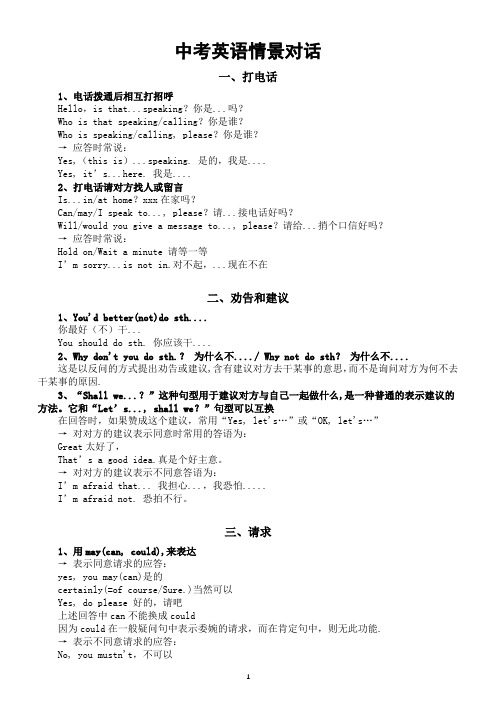
中考英语情景对话一、打电话1、电话拨通后相互打招呼Hello,is that...speaking?你是...吗?Who is that speaking/calling?你是谁?Who is speaking/calling, please?你是谁?→应答时常说:Yes,(this is)...speaking. 是的,我是....Yes, it’s...here. 我是....2、打电话请对方找人或留言Is...in/at home?xxx在家吗?Can/may/I speak to..., please?请...接电话好吗?Will/would you give a message to..., please?请给...捎个口信好吗?→应答时常说:Hold on/Wait a minute 请等一等I’m sorry...is not in.对不起,...现在不在二、劝告和建议1、You'd better(not)do sth....你最好(不)干...You should do sth. 你应该干....2、Why don't you do sth.?为什么不..../ Why not do sth?为什么不....这是以反问的方式提出劝告或建议,含有建议对方去干某事的意思,而不是询问对方为何不去干某事的原因.3、“Shall we...?”这种句型用于建议对方与自己一起做什么,是一种普通的表示建议的方法。
它和“Let’s..., shall we?”句型可以互换在回答时,如果赞成这个建议,常用“Yes, let's…”或“OK, let's…”→对对方的建议表示同意时常用的答语为:Great太好了,That’s a good idea.真是个好主意。
→对对方的建议表示不同意答语为:I’m afraid that... 我担心...,我恐怕.....I’m afraid not. 恐拍不行。
中考英语情景对话常考句型
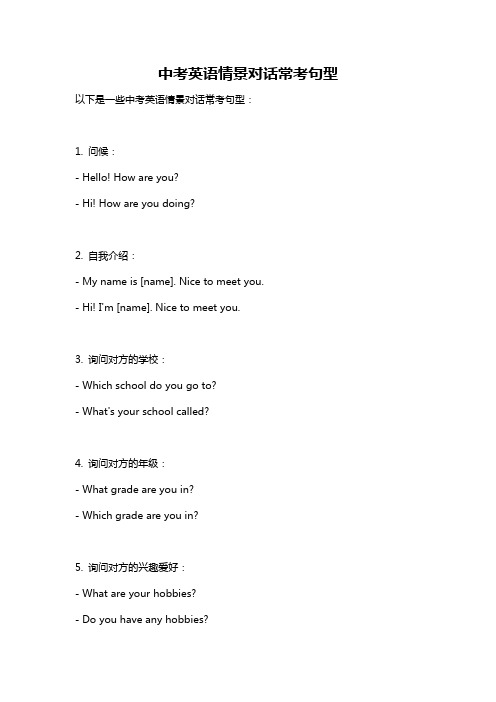
中考英语情景对话常考句型以下是一些中考英语情景对话常考句型:1. 问候:- Hello! How are you?- Hi! How are you doing?2. 自我介绍:- My name is [name]. Nice to meet you.- Hi! I'm [name]. Nice to meet you.3. 询问对方的学校:- Which school do you go to?- What's your school called?4. 询问对方的年级:- What grade are you in?- Which grade are you in?5. 询问对方的兴趣爱好:- What are your hobbies?- Do you have any hobbies?6. 邀请去某个地方:- Would you like to go to [place] with me? - Do you want to come to [place] with me?7. 同意邀请:- Sure, I'd love to!- That sounds great! Count me in!8. 拒绝邀请:- I'm sorry, but I can't. I have other plans.- I'm afraid I can't. Maybe next time.9. 询问对方的家人:- How many people are there in your family? - Do you have any siblings?10. 询问对方的喜欢的食物:- What's your favorite food?- What kind of food do you like?11. 下雨天询问活动:- What would you like to do on a rainy day?- Do you have any suggestions for indoor activities on a rainy day?12. 询问对方的周末计划:- What are you going to do this weekend?- Any plans for the weekend?这些常用句型可以帮助你在各种情境中有效地进行对话。
中考英语听力常考知识点总结
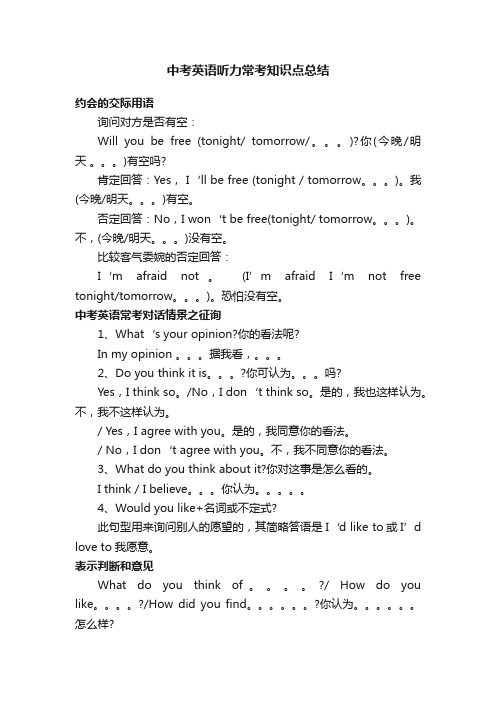
中考英语听力常考知识点总结约会的交际用语询问对方是否有空:Will you be free (tonight/ tomorrow/。
)?你(今晚/明天。
)有空吗?肯定回答:Yes,I‘ll be free (tonight / tomorrow。
)。
我(今晚/明天。
)有空。
否定回答:No,I won‘t be free(tonight/ tomorrow。
)。
不,(今晚/明天。
)没有空。
比较客气委婉的否定回答:I‘m afraid not。
(I’m afraid I‘m not free tonight/tomorrow。
)。
恐怕没有空。
中考英语常考对话情景之征询1、What‘s your opinion?你的看法呢?In my opinion 。
据我看,。
2、Do you think it is。
?你可认为。
吗?Yes,I think so。
/No,I don‘t think so。
是的,我也这样认为。
不,我不这样认为。
/ Yes,I agree with you。
是的,我同意你的看法。
/ No,I don‘t agree with you。
不,我不同意你的看法。
3、What do you think about it?你对这事是怎么看的。
I think / I believe。
你认为。
4、Would you like+名词或不定式?此句型用来询问别人的愿望的,其简略答语是I‘d like to或I’d love to我愿意。
表示判断和意见What do you think of。
?/ How do you like。
?/How did you find。
?你认为。
怎么样?What‘s you opinion of。
?你对。
的看法是什么?Tell us what you think about/ of。
谈谈你对的。
看法?We’d like to have your views/ opinions about。
中考英语40句常考情景对话
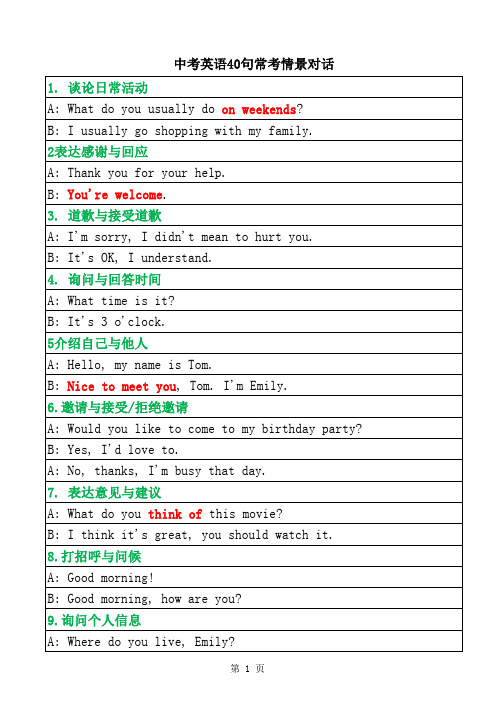
26. 谈论解决问题与应对挑战 A: How do you deal with difficult situations? B: I try to stay calm and think of a solution. 27. 谈论交通与出行
中考英语40句常考情景对话
1. 谈论日常活动 A: What do you usually do on weekends? B: I usually go shopping with my family. 2表达感谢与回应 A: Thank you for your help. B: You're welcome. 3. 道歉与接受道歉 A: I'm sorry, I didn't mean to hurt you. B: It's OK, I understand. 4. 询问与回答时间 A: What time is it? B: It's 3 o'clock. 5介绍自己与他人 A: Hello, my name is Tom. B: Nice to meet you, Tom. I'm Emily. 6.邀请与接受/拒绝邀请 A: Would you like to come to my birthday party? B: Yes, I'd love to. A: No, thanks, I'm busy that day. 7. 表达意见与建议 A: What do you think of this movie? B: I think it's great, you should watch it. 8.打招呼与问候 A: Good morning! B: Good morning, how are you? 9.询问个人信息 A: Where do yon New York. 10. 询问与回答喜好 A: Do you like pizza?[ˈpiːtsə] B: Yes, I love pizza! 11. 谈论学校生活 A: How was your day at school? B: It was good, I had a great science[ˈsaɪəns] lesson. 12. 谈论家庭情况 A: How many people are in your family? B: There are four of us, my parents, my sister, and me. 13. 谈论兴趣爱好 A: What do you like to do in your free time? B: I like to read books and play guitar.[ɡɪˈtɑː(r)]吉它 14. 谈论穿着与打扮 A: I like your new shoes, where did you get them? B: Thanks, I got them at the mall.在商场 15. 谈论学习与作业 A: Do you have a lot of homework? B: Yes, I have to study a lot for my exams. 16. 谈论食物与饮料 A: What's your favorite food? B: Pizza is my favorite. 17. 询问与回答日期 A: What's the date today? B: It's the 15th of June. 18. 谈论老师与同学 A: Who's your favorite [ˈfeɪvərɪt] teacher? B: My math teacher, she's really nice.
中学英语听力最常考的30个场景对话

十三、谈论天气情况1、It is raining /blowing /snowing ,(isn‘t it ?)下雨了/刮风了/下雪了,(对吗?)It is +adj ./n.(today ). 今天的天气...这类句子都是用来发表对天气的看法的.“It is +ady /n (today )”中间可用表述天气情况的形容词或名词,应答时可说:Yes ,it is .2、What‘s the weather like today ?今天天气怎样?/ What’s the weather going to be like ...?天气将怎样?这两个句型都是用来询问天气情况的.前者询问当天的天气后者询问未来的天气,在like 后加表示未来的时间状语(如tomorrow .the day after tomorrow )应答时可说:It‘s fine /warm /cold /hot ...或It’s going to be fine /warm/cold /hot ...“What‘s the weather like ...?”也可以用“How is the weather...?”表达,其意思想同.十四、问路及应答的交际用语Excuse me. Can you tell me the way to ...?劳驾,请告诉我去.....(地方)怎么走?/ Excuse me. Han can I get to...?劳驾,问怎样去.....(地方)?/ Excuse me,please,where is...?劳驾,请问去...的路怎么去?问路时,首先说“Excuse me.”意思是“请原谅”、“请问”、“劳驾”,表示因为打扰而道歉,然后再问路,应答时可根据实际情况回答.常用的有以下几种表达:How far is it from here?它离这里多远?/ It‘s about...meters from here. 它离这里大约...米远./ It’s about...yards/meters down this street./ Go straight ahead till you see...沿着这条街走约...米就到了./ Go straight ahead till you see... 照直走到...(地方)为止 ./ Godown/along this street. 沿着这条街走下去./ Take this street/road. 走这条街/大路./ Go through the gate and you‘ll find the entrance to...穿过大门,你就会看到...的几口处./ Go down/along this street till you get to ...沿着这条街走到...(地方)为止./ Turn right/left at the first/second crossing.在第一/二个十字路口向右/左转./ You’d better take a taxi/minibus/No.5 bus...你最好坐出租车/乘小公共汽车/ 乘5路公共汽车.十五、就餐时的交际用语1、就餐时,当主人询问客人想吃/喝点什么时,主人常说:Would you like sth.(to eat / to drink)?你想吃/ 喝点...吗?/ What would you like (to have)?你想要吃点什么?/ Would you like some more...?你还要点...吗?/ How about (some more) ...?(再)来点...怎么样?2、就餐时,当主人主动请客人吃/喝点东西时,主人常说:Help yourself to...?你吃/喝点...吧./ Let me give you...?让我来人你...吧./ Make yourself at home. 请随便吃,不要客气.3、当客人表示愿意或同意吃/喝点东西时,常回答:Yes,please,好的.I‘d like...我想来点....Well,just a little,please. 好的,请来一点儿.4、当客人表示不想吃/喝东西或表示已经吃饱/喝好了时,常回答:No,thanks,谢谢,不要了.Thank you ,I‘ve had enough. 谢谢,我已经够了.I’m full,thank you. 谢谢,我吃饱了.十六、告别1、告别前用语I‘m afraid I must be off/be going/be leaving now.恐怕我得走了./ I think I must be off/ be going/ be leaving now.我看我得走了./ Well,It’s getting late.噢,天已晚了./ I‘ve got to go now.现在我必须得走了./ Maybe we could get together sometime.也许我们什么时候还能再聚一聚.2、对告别前用语的回答Thank you for coming.多谢你的光临./ Yes,I‘ve enjoy it.对,我很开心./ My pleasure,too.这也是我的荣幸./ Could you stay a little longer?你能再呆一会儿吗?/ In that case,I won’t keep you.那么我就不留你了.3、告别用语Good-bye!/ Be seeing you soon. Bye!/ Bye!/ Bye for now. / See you. / See you later. Bye-bye!再见!Good night.晚安!Have a pleasant journey!/ Wish you a pleasant journey.祝你旅途愉快!Don‘t forget to give me a ring.不要忘记给我来电话.Remember to give me a ring.记住给我来电话.4、对告别用语的回答Good-bye!再见!/ Good night!晚安!You too. / Same to you.你也一样.So long. Take care.再见!保重.十七、赞美和恭维及应答(Making Compliments and Responses)It‘s beautiful. 真漂亮!/ That’s marvellous!真了不起!/ It‘s a lovely picture!多好看的照片!/ I’m glad you did...... 我很高兴你做了....../ I‘m pleased you did... 我很兴奋你做了....../ How clever of you!你好聪明哦!/ I like the way you did...... 我喜欢你做......的方式/ I admire the way you do...... 我敬佩你做......的方式/ I’ve never seen such a...... 我还没有见到过如此的......./ What a nice coat you have!你的外衣很漂亮哦!/ You look very smart today!你今天看上去好神气哦!/ What a wonderful house!你的房子好漂亮哦!/ It matches your suit perfectly. 这和你的衣服很相配./ You‘ve certainly given us a very good lecture. 你的确给我们做了一场精彩的讲演./ You have a beautiful smile.你的笑真美. / You have a good sense of humour.你挺有幽默感的./ Your wife is beautiful. 你的妻子真漂亮./ You gave an excellent speech.你的演讲真精彩. / Your car is nice.你的车真漂亮. / This is a lovely dinner./The dinner is great.这顿饭真不错. / That’s a very nice suit you‘ve got on.你穿的衣服很漂亮. / That was a marvellous speech. 那是一场了不起的演讲./ You look wonderful this evening!你今晚看上去很不错!/ What a nice living room so comfortable!我很喜欢你的家具,你在哪儿买的?/ I appreciate your new car.我非常欣赏你的新车.(对朋友的精彩表演、杰出成绩,你若亲临现场,可直接为他大声喝彩)Well done,Johnson!干得好,约翰逊!/ I‘m so happy for you!真为你感到高兴!/ It’s very well deserved!就该这样!/ You must be terribly pleased!你一定非常高兴吧!/ Aren‘t you very excited,Tom?汤姆,你一定很激动吧!Oh,I‘m glad you like it. 哦,你喜欢,我真高兴./ I’m glad you think so. / I‘m delighted you think so. 你能这样认为我真高兴./ Oh,thank you.哦,谢谢!/How kind of you to say that. 你能那样说真好./ I’m glad to hear that.听到这我真高兴. / Thanks for saying so.谢谢你这样说.十八、约会的交际用语1、询问对方是否有空:Will you be free (tonight/ tomorrow/...)?你(今晚/明天 ...)有空吗?肯定回答:Yes,I‘ll be free (tonight / tomorrow...).我(今晚/明天...)有空.否定回答:No,I won‘t be fre e(tonight/ tomorrow...).不,(今晚/明天...)没有空.比较客气委婉的否定回答:I‘m afraid not. (I’m afraid I‘m not free tonight/tomorrow...).恐怕没有空.2、询问约会的时间、地点:What time shall we meet?我们什么时候会面呢?/Where is the best place to meet?我们最好在什么地方会面呢?/ How about 5 p.m./ tonight/ tomorrow...?下午五点(今晚/明天......)怎么样?/ What about (meeting)at the gate/ outside the station...?在大门口/在车站外边碰头怎么样?/Shall we meet at 7:30 p.m. at the gate ?我们下午七点半大门口碰头好吗?/ I‘ll meet you at the theatre at 7:30 p.m.我会在七点半在剧场见你./ I suggest 7 o’clock.我建议七点钟(碰头).3、有关约会的时间,地点的询问和应答,可根据具体情况进行.十九、关心和焦虑的交际用语1、What‘s wrong/the matter(with)...?表示的意思是“你怎么啦?”、“你有什么不舒服?”、“出了什么毛病?”,用来询问对方的疾病、痛苦、忧伤、事故等情况,.句中的wrong作“失常的”、“状况不佳的”,matter作“麻烦事”、“毛病”、“故障,指病痛或事故的原因.”What‘s wrong with...和What’s the matter with...?两个句子意思相同,可以互换.2、Is there anything the matter?意思是“出了什么事吗?”、“有什么毛病吗”这个句子还可以简化为:anything the matter?3、We are anxious/worried about...“be anxious/worried about”意思是“为(某人/某事)担心”,可用于各种时态,其中的be可用get代替(即“get anxious /worried about”)4、There is no need to be worried.没有必要担心./ There is nothing to worry about.没有什么可以担心的.对于别人的担心或焦虑,常可以用以上句子表示宽慰.二十、喜好、厌恶和偏爱I. 表示喜好1、用I like /love sth./sb. 来表达.(表示“我不喜欢某人/某事”)2、用I like/love to do sth./doing sth.来表达(表示“我为喜欢做某事”的意思)注意:1)在like后加上表示程度的词如:very much ,a lot,little,等3、用I enjoy sth./doing sth.来表达.(表示“我喜欢/欣赏某事”的意思)II. 表示厌恶1、用I don‘t like (to).......来表达.(表示“我不喜欢某人/某事”的意思)2、用I hate (to).......来表达(表示“我不喜欢某人/某事”的意思)3、用.Idon‘t enjoy sth./doing sth来表达.(表示“我不喜欢某人/欣赏某事”的意思)III. 表示偏爱1、用I prefer A to B.来表达.(表示“ 我喜欢A甚过喜欢B”的意思)2、用would rather do........来表达(表示“宁愿做........”的意思)二十一、表示同意和不同意的用语1、表示同意Certainly./ Sure./ Of course.当然可以./No problem. 没有问题.Yes ,I think so.是的,我也这样认为./ I agree with sb.我同意某人的看法./ I agree with sb. 我同意某事.I agree that... 我同意.../ Good idea !/ That‘s a good idea.好主意./ It’s a good idea to do sth. 干某事是人好主意./Yes ,please.是的,请吧./ You are right . 你是对的./ That‘s true./Ok./All right. 好的./ That’s just what I think. 我也是那么想的./ That‘s my opinion,too.我也是那么想的. /There’s no doubt about it.那毫无疑问.2、表示不同意.No,I don‘t think so. 不,我不这样认为./ I don’t agree with sb. 我不同意某人的看法./ I don‘t agree to sth. 我不同意某事./ I don’t agree that . 我不同意.... / I‘m afraid not. /I’m afraid that...恐怕(不)...二十二、表示肯定和否定的用语1、表示肯定:Sure./of course./Certainly.肯定/当然/一定./ I‘m sure of/about...我确信... / I’m sure that...我确信.../ That‘s sure.是真的.2、表示否定No.不是./ I‘m not sure of/about...对...我没有把握./ I’m not sure whether/if...我没有把握...二十三、语言困难(Language Difficulties )1、当不知某个词的发音时,用How do you pronounce...?这个词你怎么读?2、当不知某个词的汉语意思时,用What‘s the Chinese meaning of the word...?...词的汉语意思是什么?类似的表过还有:What do you mean by...in Chinese?/What’s the Chinese for...?/ What does ...mean in Chinese?3、当不知某个词的拼写时,用Could/can you spell the word?你能拼一下这个词吗?4、当没听清(懂)对方讲话内容时,用I‘m sorry,I didn’t quite follow(catch)you.对不起,请再说一遍时,可用下列句型表达:I‘m afraid I didn’t follow (catch)起,我没有听懂(清).5、当没听懂(清)对方所说的话或请求对方再重复you./Would you mind I repeating that?/pardon ?Beg your pardon?/ I beg your pardon?/ Could you say that again ?/Would you please say that again?/Would you please say that more slowly?6、问对方是否听懂(清)时,用:Is that clear?/Have I made myself clear?/Do you see what I mean ?/ Do you understand?7、当不知如何表达某一意思时,用:I‘m sorry,I know only a little English. I don’t know how to say it in English(I don‘t know the exact word in English),but it is some thing like...对不起,我仅懂一点点英语.我不知如何用英语表达这个词(我不知道英语中能表达该意思的准确的词),但它有点象....8、当表示在语言某方面上有无困难时,可用I have some(no,much,little,a little,some)difficulty (trouble)in pronouncing(spelling,......) .......意为“在做某事方面有一些(没有、很多、很少、有一点困难).”或用have some (no,little,a little,much ,any)difficulty(trouble)with sth.9、订正或澄清错误时,用:I‘m sorry,I have made a mistake.对不起,我犯了个错误.I’m sorry,I should have said...对不起,我本该说....That‘s not what I meant.我不是那个意思.What I mean is ...我的意思是....I’ll try to explain that again,我将尽力再解释一下.二十四、表示禁止和警告的交际用语1、Look out!/Be careful!/ Take care!这三个句子都作“当心、小心”解,look out语气最强,往往用于某种紧急的情况或可能出现危险的场合,其后接for短语.take care语气没有那样强,多用于对可能出现的不测作出预先的提醒或警告,其后可接不定式短语或that从句,从句的谓语动词用一般现在时.be careful 可代替look out和take care,其后也可接不定式以及about,with等介词短语.2、下列句型也可用来表示警告:Don‘t do sth.......or......不要干某事,否则....If you.......you’ll......如果你...,你就会...3、以否定祈使句或“No+-ing”表示禁止和警告.Don‘t smoke!不准抽烟!/ Don’t be late!不要迟到!/ Don‘t take pictures here!不要在此拍照!/ No smoking!不准抽烟!/ No parking!不准停车!/ No spitting!不要随地吐痰!4、用can‘t / mustn’t表示禁止和警告.二十五、询问国籍、籍贯,姓名及职业时的常用语What‘s your nationality?Are you American...?你是哪国人?/ 你是美国人吗?/ Are you from American / Britain... ?你是美国人/英国人...吗?/ Where are you from ?你是哪里人?/ What country are you from ?你是哪个国家的?/ What are you?你是干什么的?/ Who are you?你是谁?/ What’s yo ur name?你叫什么名字?二十六、谈论爱好Talking about Hobbies.询问对方的业余爱好What are your hobbies?你的爱好是什么?/ What do you often do in your free/ spare time?你在业余时间经常做什么?/ What are your favorite sports?你最喜爱的运动是什么?/ Do you like+drawing/ playing chess....?你喜欢绘画/下棋....?/ What are you interested in after work?下班后你对什么有兴趣?叙述自己的爱好My hobby is.....我的爱好是...... / I enjoy+watching Tv/ listening to music......我喜欢看电视/ 听音乐....../ I like /love + collecting stamps /fishing......我喜欢集邮/ 钓鱼....../ I find.....very interesting.我觉得.......很有趣.二十七、表示遗憾、同情的交际用语1、be afraid that.......恐怕......2、It‘s a pity(that).....真是很遗憾..... 这是表示遗憾的交际用语,后面跟的that从句就是所指的遗憾的事情.在口语中that常可省略.3、What a pity/shame!真是遗憾!(真可惜!)用的是省略的感叹句.(语气较随便)表示同情时常用I‘m sorry to hear......或I’m so sorry.来表达,hear后可接that也可接that 从句,表示“听说......我很难过”,注意I‘m so sorry.在意思上不同于道歉.二十八、有关意愿和希望的交际用语I. 询问对方的意愿1、What do you want/plan/intend/hope to do...?/你想要/计划/打算/希望干什么?应答时用:I want / plan / intend / hope to do...我想要/计划/打算/希望干什么.注意:在动词want / plan / intend / hope...之后要接不定式(而不接动名词形式)作宾语.2、What‘s your plan for ...?(What are your plans for...?)你有...有什么计划?应签时可用I plan / intend / hope + to do ...或视其具体情况作答.3、What do you feel like doing?你想做什么呢?在答语“I feel like doing.....”之后还可跟名词.4、What would you like to do sth?你想做什么呢?答语“I‘d like to(do sth.)”是“I would like”的省略,后跟动词原形.II. 表示希望用的句型:I want / wish / hope to....我希望做什么/ I hope + that - clause. 我希望... / I wish + that - clause.但愿...注意:上述句型中,在I hope / wish 之后跟由that引导的宾语从句.在口语中,that常可省略.在I wish后的宾语从句中用陈述语气;在that后的宾语从句中用虚拟语气.二十九、表示判断和意见What do you think of....?/ How do you like....?/How did you find......?你认为......怎么样?What‘s you opinion of......?你对........的看法是什么?Tell us what you think about/ of.......谈谈你对的.......看法?We’d like to have your views/ opinions about.......我们想听听你对......的看法?Well done/ Good work!很好!干得不错!Not bad.不错!It certainly is.的确如此.It‘s correct to do(sth)......是对的.It seems (to me)that-clause.(在我看来)好象.......In my opinion,...../ As I see it, ...依我看,......So far as I know, ... / From what I know/ understand......就我所知,......I would say......我认为......I think / believe / suppose......很可能......I’m sure......我确信......I don‘t think......我认为....不...It doesn’t seem possiblethat-clause,.........好象不可能.三十、征询1、What‘s your opinion?你的看法呢?In my opinion ...据我看,...2、Do you think it is...?你可认为...吗?Yes,I think so./No,I don‘t think so.是的,我也这样认为.不,我不这样认为./ Yes,I agree with you.是的,我同意你的看法./ No,I don‘t agree with you.不,我不同意你的看法.4、Would you like+名词或不定式?此句型用来询问别人的愿望的,其简略答语是I‘d like to或I’d love to我愿意。
英语听力最常考的30个对话情景汇总(上)

英语听力最常考的30个对话情景汇总(上)听力一般都有固定的问答模式、题型,小天整理了听力中最常考的30个对话情景,赶紧收藏吧!一、打电话(Making phone calls)1、请给某人/某单位打电话Would/could/can you ring up...?请你...打电话好吧?句中ring up意思是“给某人打电话”,除了用ring up外,还可用call, call up, telephone 等,意思相同can you...?用得最普通:could/would you...?用在正式场合,比较礼貌。
2、电话拨不通时常说:The line is busy , I can't get through.电话占线,我打不通。
I'll try again later.我过一会儿再打.其中line指电话线路,get through 指接通电话。
3、电话拨通后相互打招呼:Hello,(name or telephone number)你好,(并通报本人的姓名或单位名称或电话号码)Hello,is that...speaking?你是...吗?Who is that speaking/calling?你是谁?Who is speaking/calling, please?你是谁?应答时常说:Yes,(this is)...speaking. 是的,我是... Yes,it's...here. 我是...4、打电话请对方找人或留言:Is...in/at home?某某在家吗?Can/may/could I speak to..., please?请...接电话好吗?Will/would you give a message to..., please?请给...捎个口信好吗?Would you tell him my telephone number, please?请你把我的电话号码告诉他好吗?Can/could you ask...to ring me back,please?请叫...给我回个电话好吗?应答时常说:Hold on/Wait a minute/One moment, please. 请等一等I'm sorry...is not in./at home now.对不起,...现在不在Can I take a message?我能给你捎口信好吗?Does he have your telephone number?他有你的电话号码吗?I'll ask him to call you back. 我叫他给你回电话。
- 1、下载文档前请自行甄别文档内容的完整性,平台不提供额外的编辑、内容补充、找答案等附加服务。
- 2、"仅部分预览"的文档,不可在线预览部分如存在完整性等问题,可反馈申请退款(可完整预览的文档不适用该条件!)。
- 3、如文档侵犯您的权益,请联系客服反馈,我们会尽快为您处理(人工客服工作时间:9:00-18:30)。
4、打电话请对方找人或留言:
Is...in/at home? 某某在家吗?/ Can/may/could I speak to...,please?请...接电话好吗?/ Will/would you give a message to...,please?请给...捎个口信好吗? / Would you tell him my telephone number, please? 请你把我的电话号码告诉他好吗?/ Can/could you ask...to ring me back, please?请叫...给我回个电话好吗?
3、What/How about +名词或动名词...? 这种句型表达随便的建议,有征求对方意见的意思,多数情况下是建议和对方一起做某事.
4、“Shall we...?”这种句型用于建议对方与自己一起做什么,是一种普通的表示建议的方法.它和“Let‘s...,shall we?”句型可以互换,在回答时,如果赞成这个建议,常用“Yes, let's.”或“OK. let’s.”
2、间接问候
1.Please give one‘s(one’s 代表不同人称的物主代词(如: my, our... 等) regards/best wishes/ love to.../ Please remember me to sb.请向某人问好./请向某人致意.
2.“Say hi/hello to...(from me)”意为“向...致意/问候”.这相当于Please give my best regards/wishes to...(请代我向...问好)的意思.
注:上述几点中祝愿(贺)的回答可用. Thanks./thank you/thanks a lot.或It‘s kind of you to say so.谢谢. /多谢. /谢谢您./谢谢你这么说.
5、在公共节日里
A: Happy New Year(to you)! 新年快乐!
B: Thanks. The same to you!(Happy New Year to you, too!)谢谢!您也一样!(也祝您新年快乐!)
二、劝告和建议(Advice and suggestion)
1、You‘d better (not)do sth... 你最好(不)干..../ You should do sth. 你应该干..../ You need(to)do sth. 你需要干....
2、Why don‘t you do sth? 为什么不..../ Why not do sth? 为什么不....这是以反问的方式提出劝告或建议,含有建议对方去干某事的意思,而不是询问对方为何不去干某事的原因.
应答时常说:
Hold on/Wait a minute/One moment, please. 请等一等./ I‘m sorry...is not in./at home now.对不起,...现在不在./ Can I take a message? 我能给你捎口信好吗?/ Does he have your telephone number?他有你的电话号码吗?/ I’ll ask him to call you back. 我叫他给你回电话.
答语可用:“Pretty well.“/ ” Very well.“ ”Everything is OK.(一切顺利)“Not too bad.“还好”.
5.对于不认识想要叫他(她)停下来时,可选用这些说法:Hey, sir(madam).喂,先生(小姐)/ Just a moment, sir(madam)等一下,先生(小姐)注意:此时不能说:“Hey! you!”
对介绍的应答
How do you do? 你好!/ I‘m pleased to know you.很高兴认识你./ Very glad to meet you.很高兴认识你./ Nice to meet you.很高兴认识你. / It’s a pleasure to meet you.认识你很高兴.
如果别人想为你办事,可你觉得不必麻烦他或者别人替你办事没有办成但你还要感谢他,这时你可以说:
Thank you just the same.同样感谢你的好意./ Thank you all the same.同样得感谢你./ It‘s very considerate of you.你考虑得真周到!/ It’s most thoughtful of you.你想得真周到!
3、当某人生日时 A: Happy birthday to you;生日快乐!B: Thank you!谢谢!
4、当某人即将做某事时A:I will take the exams tomorrow.我明天将参加考试.B: Good luck (to you)!(I wish you success!)祝您顺利!(祝您成功!)
答语往往是:“Fine, thank yo可选用这些表达法.How‘s everything with you?/ How is everything going? / How are you getting on? / What’s no/ up? 近来怎么样?
2.您好!初次见面打招呼的用语How do you do? / Glad to meet you.
答语也是“How do you do? / Glad to meet you.”
3.对有一段时候没有见面的熟人可选用这些句型:How are you?/ How have you been?你(您)好吗?
注意:对对方的建议表示同意时常用的答语为:
Great太好了.That‘s a good idea.真是个好主意.对对方的建议表示不同意,或根本不能满足对方的要求而表示歉意时的常用答语为: I’m afraid that... 我担心....,我恐怕.....I‘m afraid not. 恐拍不行.
在回答别人的感谢时,常说:
You‘re welcome.你是受欢迎的./ Not at all.没事儿./ Don’t mention it.不用了./ It‘s my pleasure.我很乐意. / No trouble at all.一点也不麻烦./ It was the least I could do.这是我应该做的.I’m glad I could do it.我很高兴能这么做.That‘s all right.没关系,不用谢.I’m delighted to have been able to do that for you.能为你效劳我很高兴.It‘s really nothing at all.算不了什么,不用谢.
七、请求允许和应答(Asking for permission and responses)
1、Can I/Could I/May I...? 我可不可以...?
这个是请求对方允许自己做某事的最普通的交际用语,其中could I...?语气最婉转;May I...? 常用在比较正式的场合;Can I...? 用得最广泛.
对于上述问候,其答语为:Of course. /Sure ,I will等.
四、感谢与应答(Thanks and responses)
Thank you./ Thanks.谢谢! / Thank you very much.非常感谢! / Thank you so much./ Thanks a lot.多谢 / Thank you very much indeed. 应该好好感谢你 / Thanks a million.万分感谢! / I don‘t know how to thank you.真不知该怎样感谢你.I’m really grateful to you.非常感谢你! That‘s most kind of you.你心眼儿真好./ You’re kind ! kind 你真好.
5、用suggest作谓语的陈述句
这种句子用于表达比较正式的建议,在会议上和讨论中使用较多,也常用于书面形式,后面常跟名词、动名词或that从句作宾语.注意跟从句时,从句中动词用动词原形式should+动词原形.
6、用Let‘s开头的祈使句
这是最普通的表达建议的方法,建议对方和自己一起做什么.let's后接动词原形.若句尾加上“shall we?”, “OK?”等用于征求对方法的词语,从而使语气委婉得多.
六、祝愿、祝贺及应答(Good wishes, congratulations and responses)
1、当某人取得成功时
I have passed the examination! 我已经通过考试了.
Congratulations(to you)祝贺你!
2、当某人外出旅行时
Good luck with your trip! 祝您们旅途平安! Have a good trip/journey.=I wish you a good trip/journey.祝你旅途愉快.祝你一路顺风./ Good trip to you./Nice journey to you.祝你旅途愉快、Have a nice/pleasant/wonderful time.=I wish you a nice/pleasant/wonderful time.祝你过得愉快.祝你玩得痛快.
7、用should,ought to等情态动词来表示“劝告”
8、用动词advise,名词advice表示劝告.
三、表示问候(Expressing greetings)
1、直接问候
1.一般打招呼用语,答语通常是重复对方的话.
Hello.你好!Hi嗨!Good morning(afternoon, evening)早上(下午、晚上)好.
中考英语听力题常见30个情景对话及常用语汇总
